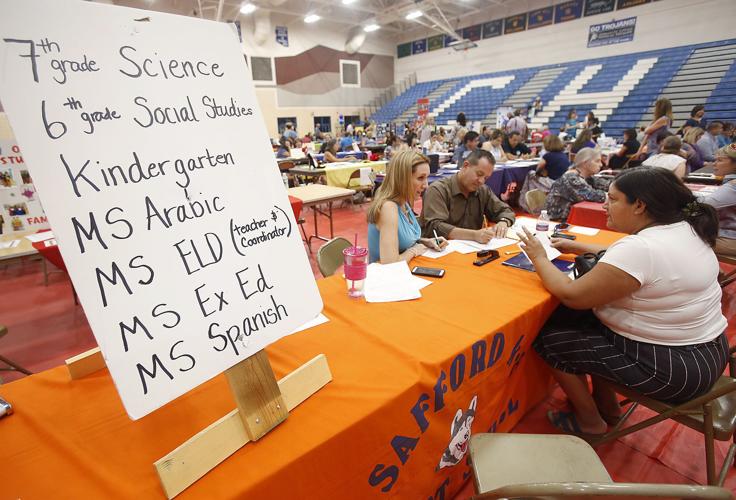Put yourself in Dawn Theodore’s position.
She had stuck out 10 years of teaching high school history at Ironwood Ridge High School, despite being laid off once. Toward the end of the last school year, now fully vested in her retirement, she was given an offer for the 2015-2016 school year.
“When they handed me my contract for my 11th year, and they offered me $35,800, it wasn’t that hard to walk away,” she said by phone from Colorado, where Theodore and her husband have moved.
Arizona’s teachers are talking to us — with their feet.
Feeling underappreciated or underpaid, many, like Theodore, are leaving the profession or the state. That has led to shortages in the Tucson area and across the state. Rural school districts are even recruiting from overseas, as the Star reported last Sunday.
Potential teachers are walking away from the idea of that profession: Even as the state’s population grows, fewer students are entering Arizona’s certification programs.
Add to that this troubling fact: About one-quarter of all Arizona’s teachers are eligible to retire in the next four years.
“It’s gone from crisis to a dire emergency,” retired Flowing Wells Superintendent Nicholas Clement told me Friday.
It’s an important time to grapple with this fact. The governor and legislators are considering four different proposals for increasing education funding, and a special session of the Legislature may occur soon.
The only proposal that faces the teacher-shortage emergency head-on is the one made by Superintendent of Public Instruction Diane Douglas. As you probably know, Douglas is a troubling figure in state government — she behaves erratically and is subject to a statewide recall effort.
But she gets certain issues right — and this is one of them. Douglas’ funding proposal is a multi-front attack on the teacher shortage. She would use the budget surplus and part of the state’s rainy-day fund to put $400 million per year toward retaining teachers by increasing their pay and reducing class sizes.
The financial wisdom of her plan is questionable. Using the rainy-day fund and budget surpluses makes the plan look unsustainable over the medium-to-long term. I’ve long advocated for closing sales-tax loopholes and raising a state tax — probably the individual income tax — to pay for our needs. Others have advocated increasing the state sales tax.
But Douglas’ priorities are right on, and no other proposal grapples with this key problem as well. Gov. Doug Ducey’s plan, for example, requires a statewide vote, would bring in an average increase of $220 million per year and likely could not be implemented till 2017.
“We’re going to lose another generation of teachers while we’re waiting for the courts or the Legislature or the initiative to be passed,” Clement said.
What’s driving teachers from the profession, or keeping people from joining it altogether, are two main factors:
“Pay and respect — they’re leaving right now because of the lack of those things,” said Katie Rogerson, interim executive director of Tucson Values Teachers. That’s the conclusion of survey of 6,000 teachers by group along with the Arizona Department of Education and the University of Arizona shows. The results are to be released this week.
The pay factor is pretty obvious. Although teachers get long periods off, most make up for it by working long, stressful hours doing work that is crucial to society when school is in session.
I spoke to one current teacher, Sara Mora, who told me that in her first three years of teaching, she netted $500 per paycheck in take-home pay, after health insurance, taxes, pension costs and all the other regular payments were factored in. Mora was working in Nogales then, but now teaches second grade in Sahuarita.
”The only reason we survived was because we made smart choices,” she said, such as buying a house on a short-sale.
But Mora, now in her sixth year, has made it through the crucible of the early years of teaching and said she loves it too much to leave.
The respect factor is a little bit more nebulous, but many teachers mention it.
“They’re educated individuals — most have bachelor’s or master’s degrees — and they’re seen by people in the community as child-care workers or probation officers,” Rogerson said, reflecting on the survey results. “They don’t feel like the community values them.”
Theodore felt that while teaching history at Ironwood Ridge. Some parents undermined her, she said, and the Legislature’s decisions left her feeling underappreciated as well as underpaid.
“I loved working with kids and seeing the light bulbs go off,” she said, choking up as we talked. “Graduation is the best night of the year.”
But once she was vested and that measly contract offer came in, the decision was clear. She had no future in teaching — at least not in Arizona.





